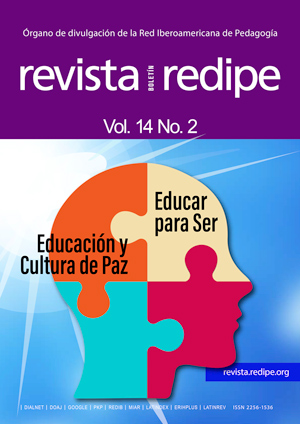Construction of critical thinking and discursive Ethos in educational experiences of teachers and students of higher education in Pereira (Risaralda, Colombia)
Main Article Content
Keywords
Critical thinking, Discursive ethos, Higher education, Teaching-learning, Journalism
Abstract
This article presents the results of the analysis of a corpus of testimonies of teachers and students dedicated to the teaching and learning of journalistic discourse, communication and digital media, in the city of Pereira-Risaralda-Colombia. They were collected from interviews with open questions about pedagogical practices, teaching and learning within the framework of the construction of ‘critical thinking’ and the discursive ethos mobilized in their discursive interactions. The objective of this analysis is to explore the construction of ‘critical thinking’ and discursive ethos in pedagogical practices mediated by ICTs, in the teaching-learning of journalism in two universities of Pereira Risaralda. The work shows how images of themselves are constructed in the discourses about what happened in the classroom. The dynamic constructs three images of the teacher as a disruptive, avant-garde and reflective subject: the ethos of the provocative pedagogue, the creative teacher and the critical trainer. It also presents the position of students and the ways of assuming their current educational processes within the framework of journalism and communication. The analysis carried out contributes to glimpsing the determinant of the teachers’ discourse and self-image for the elaboration of students’ critical thinking, as well as their current tendency to privilege journalism far from conventional pedagogical practices for the elaboration of reports and news of sociopolitical interest.
References
Amossy, R., & Zavaglia, A. (2007). O lugar da argumentação na análise do discurso: abordagens e desafios contemporâneos. Filologia e linguística portuguesa, (9), 121-146.
Amossy, R.(2010); La présentation de soi. Ethos et identité verbale. París: PUF. 228 pp. ISBN: 978-2-13-058095-9. Rétor, 1(1), 104-112.
Andreu-Andrés y García, Casas (2014). La evaluación de la participación en equipos de trabajo universitarios. Revista WPOM Working Papers Operations Management, 5(1), 1-14. http://dx.doi. org/10.4995/wpom.v5il.1758
Bailin, S. Case, R. Coombs, J. y Daniels, L. (1999b). Conceptualizing critical thinking. Journal of Curriculum Studies, 31 (3), 285-302. http:// www.iskconeducation.org/download/ BAILIN,-CASE,COOMBS%20&%20 DANIELS%20%20Conceptualizing%20 critical%20thinking.pdf.
Berger, P y Luckman, T. (1968). La construcción social de la realidad. Buenos Aires: Amorrortu editores.
Curiche – Aguilera, D.M. (2015). Desarrollo de habilidades de pensamiento crítico por medio de aprendizaje basado en problemas y aprendizaje colaborativo mediado por computador en alumnos de tercer año medio en la asignatura de filosofía en el internado nacional Barros Arana. [Tesis de Maestría en Informática educativa, Universidad de Chile. Facultad de Ciencias Sociales. Escuela de Postgrado]. http://repositorio.uchile. cl/handle/2250/136541
Díaz, L., & Montengro, M. (septiembre, 2010). Las prácticas profesionales y el desarrollo del pensamiento crítico. [Presentación de paper] XXXII Simposio de Profesores de Práctica Profesional. Ponencia. Rosario: Facultad de Ciencias Económicas y Estadística. Universidad Nacional de Rosario. http://www.economicas.uba.ar/wpcontent/uploads/2016/05/CECONTA_ SIMPOSIOS_XXXII_Santiago_del_ Estero_2010.pdf
Ennis, R. (1989). A taxonomy of critical thinking dispositions and abilities. In Baron, J. and Sternberg, R., (eds.), Teaching Thinking Skills: Theory and Practice, 9-26. New York: W. H. Freeman and Company
Facione, P. A. (1990). Critical Thinking: A Statement of Expert Consensus for Purposes of Educational Assesment and Instruction. Recuperado en septiembre de 2021, de www.insightassessment. com: file:///C:/Users/57310/Downloads/ DEX2014reprinting.pdf
Facione, P. A. (1990). The California critical thinking skills test: college level technical report #1 experimental validation and content validity. Manuscrito inédito. Universidad de Santa Clara. California. Recuperado de https://citeseerx.ist. psu.edu/viewdoc/download?doi=10.1.1. 131.8583&rep=rep1&type=pdf
Facione, P.A; Facione, N.C. y Giancarlo, C.A. (2000). The disposition toward critical thinking: Its carácter, measurement, and relationship to critical thinking skill. Informa l Logic, 20, 61-84. https://doi. org/10.22329/il.v20i1.2254 https://ojs. uwindsor.ca/index.php/informal_logic/ article/view/2254
Facione P. A. (2007). Pensamiento crítico. ¿qué es y por qué es importante? Manuscrito inédito. Universidad L o y o l a , Chicago. Recuperado de https://comenio.files.wordpress. com/2007/09pensamiento-critico.pdf
Facione, P. A. (2013). Critical Thinking: What it is and Why it counts. Recuperado en septiembre de 2020, de www. insightassessment.com:http:// www.insightassessment.com/CTResources/Teaching For- and-AboutCritical-Thinking/CriticalThinking-What-It-Isand-Why-It- Counts/ Critical-ThinkingWhat-It-Is-and- Why-ItCounts-PDF
Goffman, E., & Kihm, A. (1973). La mise en scène de la vie quotidienne (Vol. 2). Paris: Les éditions de minuit.
Goffman, E. (1974). Frame analysis: An essay on the organization of experience. Harvard University Press.
Halpern, D. (1998). Teaching critical thinking for transfer across domains [La enseñanza del pensamiento crítico para la transferencia a través de dominios]. American Psychologist Associations, 53(4), 449-455.
Halpern, D.F. (2003). Pensamiento y conocimiento: Introducción al pensamiento crítico (4ª ed). Hillsdale, Nueva Jersey: Erlbaum.
Halpern, D.F. (2006). Halpern critical thinking assessment using everyday situations: background and scoring standards (2[degrees] report). [Unpublished manuscript]. Claremont, CA: Claremont McKenna College.
Herrero, J. (2018) Elementos del pensamiento crítico. Segunda edición (revisada y ampliada). España: Universidad de Alcalá.
Lodico et al. (2010). Methods in Educational Research: From theory to practice. San Francisco: Jossey-Bass. 2nd edition.
López-Aymes, G. (2012), Pensamiento crítico en el aula. Estado de Morelos: Universidad Autónoma. Disponible en: http://educacion.to.uclm.es/pdf/ revistaDI/3_22_2012.pdf.



